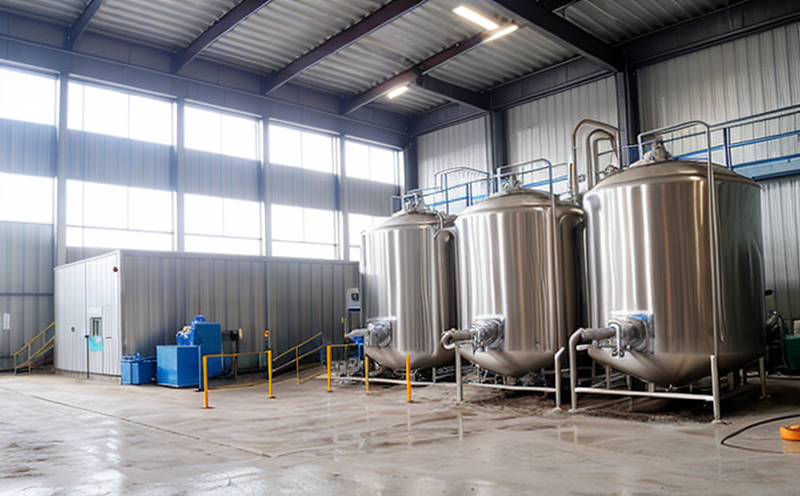Industrial Process Water Testing
In industrial settings, water plays a critical role in various processes ranging from manufacturing to chemical production. The quality of process water directly impacts product quality and operational efficiency. Therefore, thorough testing is essential for ensuring that the water used meets stringent industry standards and regulatory requirements.
Industrial process water can be subjected to numerous contaminants including but not limited to heavy metals like lead and mercury, organic compounds such as BTEX (benzene, toluene, ethylbenzene), pesticides, and various salts. The presence of these substances could cause equipment malfunction, product contamination, or even safety hazards if not controlled.
Our laboratory offers a comprehensive suite of tests aimed at monitoring and ensuring the quality of industrial process water. These tests include physical properties such as pH level, conductivity, temperature, and total dissolved solids (TDS). Chemical analyses can detect trace amounts of metals, organic compounds, and other pollutants down to parts per billion levels.
Biological assessments are also crucial in industrial settings where microorganisms play a significant role. We conduct microbial counts and identify potential pathogens that might compromise product safety or cause contamination issues.
The testing process begins with sample collection, which is critical for accurate results. Samples must be representative of the entire water body being analyzed. Proper labeling ensures traceability throughout the analytical procedure. Once collected, samples undergo rigorous preparation steps including filtration, dilution if necessary, and preservation to prevent degradation or alteration during storage.
Our state-of-the-art laboratory uses advanced instrumentation for precise measurements. For instance, atomic absorption spectrophotometry (AAS) is employed when heavy metals need to be quantified down to nanogram-per-liter sensitivity levels. Gas chromatography-mass spectrometry (GC-MS) provides detailed profiles of volatile organic compounds present in the sample.
After analysis, results are interpreted according to relevant international standards such as ISO 6223:1984 for potable water quality or ASTM D1253-07(2017) for wastewater treatment plant effluent. Compliance with these standards ensures that the industrial process water meets safety and environmental protection regulations.
The importance of accurate and reliable testing cannot be overstated in maintaining a robust industrial environment. By continuously monitoring process water quality, industries can avoid costly disruptions due to unforeseen contamination events or equipment failures while also upholding their commitment towards sustainability practices.
Industry Applications
The application of Industrial Process Water Testing spans across multiple sectors including chemical manufacturing, pharmaceuticals, electronics fabrication, and food & beverage processing. Each industry has unique requirements based on its specific processes and end products.
In the chemical manufacturing sector, proper water quality is vital for reactions that involve sensitive chemicals. Contaminants in process water can interfere with these delicate balances leading to reduced yields or even safety risks. Through regular testing, potential issues are identified early allowing adjustments to be made before they escalate into major problems.
Pharmaceutical companies rely heavily on pure water throughout their production lines from raw material preparation right through to final product formulation. Any impurities detected in the process water could lead to contamination of drug products potentially causing severe health consequences for consumers. Therefore, stringent testing protocols are followed ensuring compliance with pharmaceutical standards like USP and EU Directive 91/414/EEC regarding water quality.
For electronics manufacturers, maintaining ultra-pure water is critical to prevent defects during semiconductor fabrication processes. Even trace amounts of impurities can result in circuit failures or reduced performance. Our testing services help maintain the cleanliness required for these advanced technologies ensuring high-quality output and reliability.
In the food & beverage industry, process waters are used extensively in various stages including cleaning equipment, preparing ingredients, and cooling products. Ensuring that this water is safe and free from harmful substances protects consumer health while complying with regulatory frameworks like FDA 21 CFR Part 117.
Quality and Reliability Assurance
The reliability of industrial process water testing is paramount to maintaining consistent product quality across all manufacturing processes. Our laboratory adheres strictly to established protocols ensuring accurate and repeatable results every time. This commitment translates into enhanced operational efficiency for our clients by minimizing downtime caused by unforeseen issues related to poor water quality.
Our team of experts employs cutting-edge technology and methodologies to provide comprehensive testing solutions tailored specifically to each client’s needs. By leveraging advanced analytical techniques such as liquid chromatography-tandem mass spectrometry (LC-MS/MS), we ensure that even minute quantities of contaminants are detected providing a clear picture of the current state of process water.
Regular calibration and validation of equipment guarantee consistent accuracy across all tests performed within our facility. We maintain strict quality control measures ensuring that each sample processed meets stringent industry standards and regulatory requirements. This includes adherence to ISO/IEC 17025 accreditation criteria which sets the benchmark for proficiency laboratories worldwide.
To further enhance reliability, we offer continuous monitoring services where periodic checks are conducted on-site at client facilities. These on-demand assessments provide real-time data allowing timely interventions when necessary preventing any adverse effects on production schedules or safety standards.
Use Cases and Application Examples
The following scenarios highlight how Industrial Process Water Testing plays a crucial role in different industrial applications:
Case Study 1 - Semiconductor Fabrication
During the semiconductor fabrication process, ultra-pure water is used extensively for cleaning and rinsing purposes. Any contamination from impurities such as salts or organic compounds could lead to defects on wafers affecting final product quality. By conducting regular tests using techniques like ion chromatography (IC), we ensure that the water meets stringent cleanliness requirements set by International Technology Roadmap for Semiconductors.
Case Study 2 - Pharmaceutical Manufacturing
In pharmaceutical manufacturing, purity levels are critical due to strict regulations governing drug safety. Our laboratory provides detailed reports on various parameters including microbial content and endotoxin limits helping manufacturers ensure that their products comply with stringent FDA guidelines.
Case Study 3 - Food & Beverage Processing
For food processors, maintaining hygienic standards is essential to prevent contamination of products. Our testing services help identify potential sources of microbiological contaminants allowing corrective actions to be taken promptly protecting consumer health and safety.





